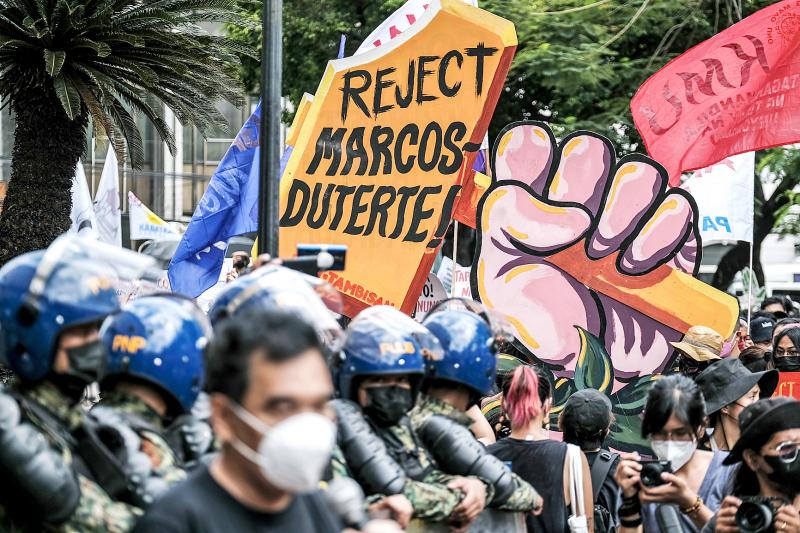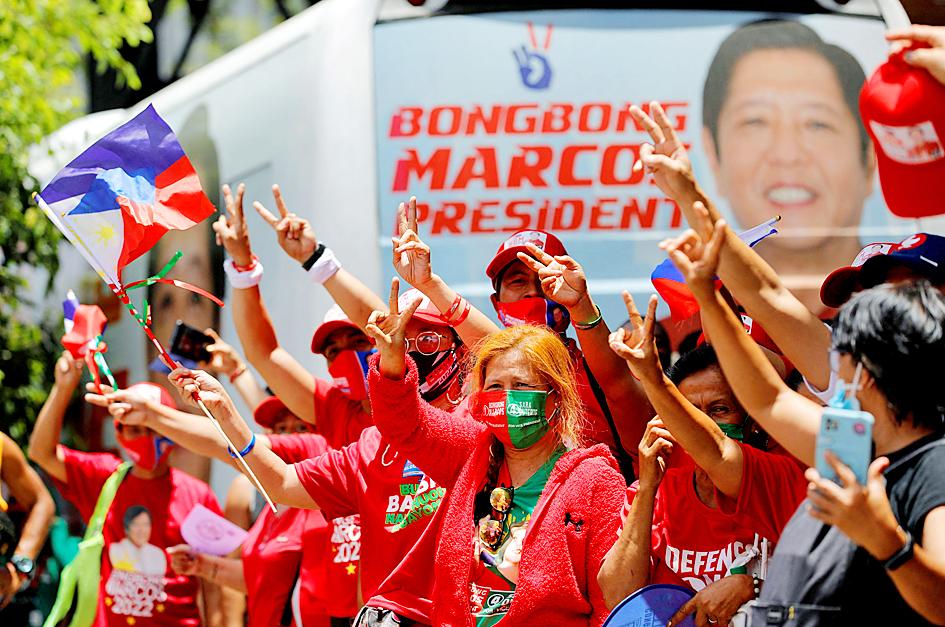The son of late Philippine president Ferdinand Marcos yesterday cemented a landslide presidential election victory, after Filipinos bet a familiar but tainted dynasty could ease rampant poverty — while dismissing warnings that the clan’s return would worsen corruption and weaken democracy.
With an initial count almost complete, Ferdinand “Bongbong” Marcos Jr had secured more than 56 percent of the vote — more than double the tally of his nearest rival, Philippine Vice President Leni Robredo, a lawyer and a liberal.
His now unassailable lead of 16 million-plus votes spells another astonishing reversal in the fortunes of the Marcos family, who have gone from the presidential palace to pariahs and back again in the space of a few decades.

Photo: Bloomberg
The Marcos victory is a hammer blow to millions of Filipinos who hoped to reverse course after six bloody years of increasingly authoritarian rule by outgoing Philippine President Rodrigo Duterte. Far from repudiating Duterte’s excesses, Filipino voters elected his daughter, Sara Duterte-Carpio, as vice president by a landslide in a parallel vote.
In 1986, Ferdinand Marcos and kleptocratic first lady Imelda Marcos were chased into exile by the “People Power” revolution. Bongbong Marcos steadfastly refused to denounce his family’s brutal and corrupt excesses in a campaign marked by a relentless online whitewashing of history.
With memories of the regime fading and muddied by countless misleading Facebook posts, Filipino voters turned to Marcos to rekindle past glories that were mostly imagined.

Photo: Reuters
“He will lift our country from the poverty we’re experiencing now,” said supporter and retired police officer Anthony Sola, who described himself as elated.
The 50-year-old dismissed allegations that the Marcoses stole as much as US$10 billion during their last period in power:
“I don’t believe they stole money, because if they did, they should have been imprisoned already,” he said.”
About 43 percent of Filipinos consider themselves poor, and 39 percent more feel they are on the borderline, a March poll by the Social Weather Survey found.
Delivering a late-night address from his campaign headquarters in Manila on Monday, a tired but beaming Marcos thanked volunteers for months of “sacrifices and work.”
However, he stopped short of claiming victory, saying that “the count is not yet done.”
A fully certified tally is not expected before May 28.
On the streets, hundreds of ecstatic supporters set off fireworks late into the night, waved the national flag and clambered onto parked vehicles to chant in victory.
Rights activists, Catholic leaders and political commentators all had warned about returning the Marcos clan to power.
Robredo admitted “clear disappointment” about the result, but vowed to continue the fight against poor governance.
The 57-year-old had promised voters that she would clean up the dirty style of politics that has long plagued the feudal and corrupt democracy, where a handful of surnames hold sway.
In the final weeks before the election, her campaign morphed into a catchall pro-democracy movement that drew almost one million people to a single protest in Manila.

Drug lord Jose Adolfo Macias Villamar, alias “Fito,” was Ecuador’s most-wanted fugitive before his arrest on Wednesday, more than a year after he escaped prison from where he commanded the country’s leading criminal gang. The former taxi driver turned crime boss became the prime target of law enforcement early last year after escaping from a prison in the southwestern port of Guayaquil. Ecuadoran President Daniel Noboa’s government released “wanted” posters with images of his face and offered US$1 million for information leading to his capture. In a country plagued by crime, members of Fito’s gang, Los Choneros, have responded with violence, using car

Two former Chilean ministers are among four candidates competing this weekend for the presidential nomination of the left ahead of November elections dominated by rising levels of violent crime. More than 15 million voters are eligible to choose today between former minister of labor Jeannette Jara, former minister of the interior Carolina Toha and two members of parliament, Gonzalo Winter and Jaime Mulet, to represent the left against a resurgent right. The primary is open to members of the parties within Chilean President Gabriel Boric’s ruling left-wing coalition and other voters who are not affiliated with specific parties. A recent poll by the

TENSIONS HIGH: For more than half a year, students have organized protests around the country, while the Serbian presaident said they are part of a foreign plot About 140,000 protesters rallied in Belgrade, the largest turnout over the past few months, as student-led demonstrations mount pressure on the populist government to call early elections. The rally was one of the largest in more than half a year student-led actions, which began in November last year after the roof of a train station collapsed in the northern city of Novi Sad, killing 16 people — a tragedy widely blamed on entrenched corruption. On Saturday, a sea of protesters filled Belgrade’s largest square and poured into several surrounding streets. The independent protest monitor Archive of Public Gatherings estimated the

Irish-language rap group Kneecap on Saturday gave an impassioned performance for tens of thousands of fans at the Glastonbury Festival despite criticism by British politicians and a terror charge for one of the trio. Liam Og O hAnnaidh, who performs under the stage name Mo Chara, has been charged under the UK’s Terrorism Act with supporting a proscribed organization for allegedly waving a Hezbollah flag at a concert in London in November last year. The rapper, who was charged under the anglicized version of his name, Liam O’Hanna, is on unconditional bail before a further court hearing in August. “Glastonbury,